Letters from Lodi
An insightful and objective look at viticulture and winemaking from the Lodi
Appellation and the growers and vintners behind these crafts. Told from the
perspective of multi-award winning wine journalist, Randy Caparoso.
Why the Certified Green seal on wine bottles is more important than ever
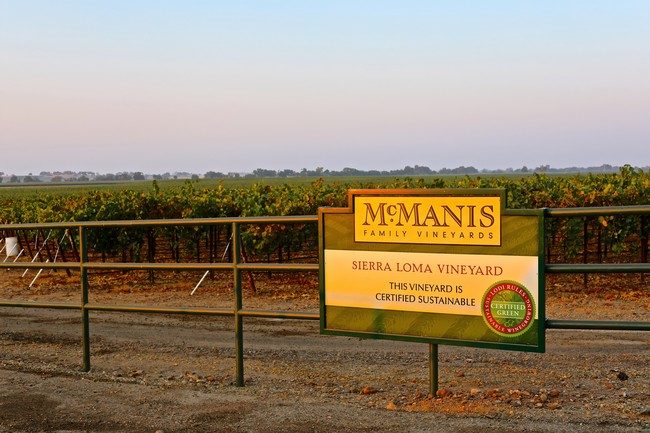
A sign seen all over the Lodi appellation, and increasingly in other wine regions outside the Lodi appellation: The Certified Green seal for vineyards certified by LODI RULES (a.k.a., CALIFORNIA RULES) for Sustainable Winegrowing.
Why is a wine bottle bearing the Certified Green seal⏤indicative of wines farmed according to LODI RULES (or its equivalent outside the Lodi appellation, CALIFORNIA RULES) for Sustainable Winegrowing⏤more important than ever?
I can think of two words: Generation Z.
So what is Generation Z (a.k.a., Gen Z), and why should you care?

"Gen Z" according to disruptionbanking.com.
Gen Z is the generation following Millennials and preceding what will soon become known as Generation Alpha. Researchers and media generally define Gen Z consumers as those born between 1997 and 2012. Thus, the oldest of them are currently 21 to 27 years old, and are primarily the the children of either the youngest Baby Boomers or Generation X.
Although, up until just a few years ago, Millennials were the generation that we most talked about as pivoting towards sustainable values when making decisions as consumers, Gen Z are consider an entirely different ball of wax. MediaCat Magazine, for instance, describes Gen Z as "the eco-conscious generation" that is even more willing to switch "to a meaningful lifestyle that aligns with its core values" than any of the previous generations.
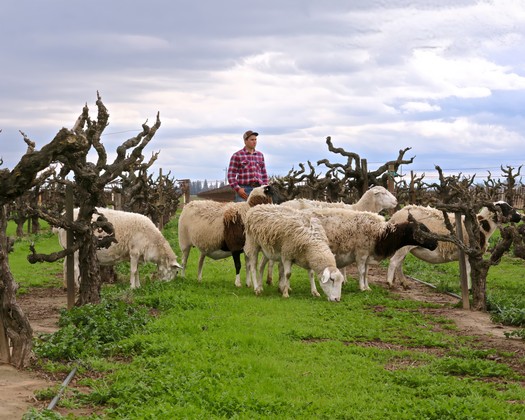
Increasingly visible sustainable practice in Lodi and other wine regions: Use of sheep for cultivation of native plants between grapevine rows.
Adds MediaCat:
Gen Z’s commitment to sustainable living is evident through their concern for climate change and their conscious choices in consumption. They are mindful of the products they buy, the clothes they wear, and the items they use, making sustainability a cornerstone of their lifestyle. This generation’s impact on sustainability practices is undeniable; they are not just followers but move-makers in driving a new wave of sustainable living practices.
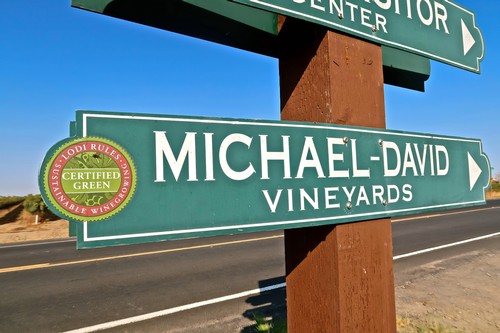
Certified Green seal in a vineyard owned by Michael David Winery, a homegrown Lodi business that not only requires sustainable certification from all of their supplier/growers, but also pays substantial bonuses for that qualification.
In a 2022 report, World Economic Forum has written:
Generation Z shows the most concern for the planet’s well-being and influences others to make sustainability-first buying decisions, according to new research. Labelled the first "digital natives" by McKinsey, but also known as the TikTok generation, most members of Gen Z are generally tech-savvy and are accustomed to making informed purchasing decisions...
Across the generational divide, consumers are prepared to spend more on sustainable products now than two years ago, comparisons with data from an earlier survey show. Spending on sustainable brands and products by Generation X has increased by 24% since 2019. And the behaviour of other groups has followed a similar trend. Gen Z’s influence has led to it being labelled "the most disruptive generation ever" by the Bank of America, a CNBC article reports.
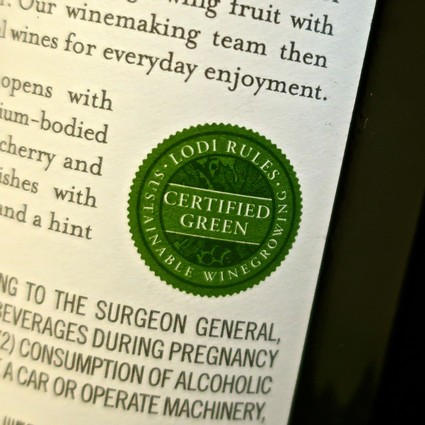
The Certified Green seal on a bottle of Lodi-grown wine farmed according to LODI RULES for Sustainable Winegrowing.
The newest generation's impact on the wine industry
In a recent Wine Enthusiast piece, Gen Z is described as a generation "embracing⏤not just acknowledging⏤sustainable practices." As contributor Kate Dingwall wrote:
This generation is watching the devastating effects of climate change unfold in real time, so it’s understandable that sustainability is important to 75% of them. They care more about environmental practices than brand names.
“In our wine club, climate conversation has been a huge topic, from seminars we’re hosting to questions we’re getting from our students,” says Quinn Bader, an MBA candidate at UCLA Anderson School of Management and the president of the school’s wine club.
“My friends focus on what goes into the product, whether it’s the farming, packaging or sustainability measures,” explains Rachel Bordes, assistant winemaker at Ram’s Gate Winery in Sonoma. “These are values we don’t mind paying for.”
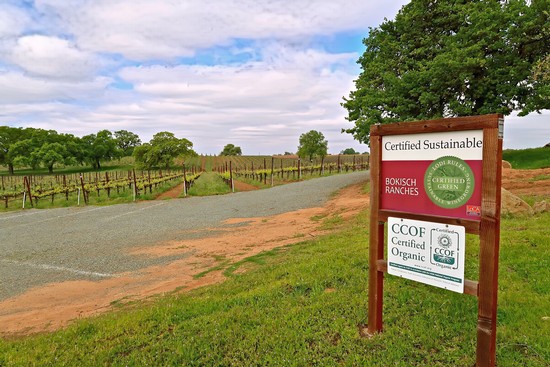
Clements Hills-Lodi vineyard that is certified by both LODI RULES for Sustainable Winegrowing and CCOF (California Certified Organic Farmers).
At this point in time, Gen Z consumers make up the smallest segment of wine consumers among all the living generations, which comes as no surprise: At no time during the past 50 or 60 years have consumers in their twenties, just past the legal drinking age, contributed significantly to wine consumption rates in the United States. As Dr. Liz Thach MW has recently reported in Forbes:
This [i.e. low consumption rates among younger generations] supports other wine lifecycle research showing that young adults enjoy experimenting with different beverages when they first reach legal drinking age, but generally do not adopt wine as a more regular part of their lifestyle until they reach their 30s, when they are more settled and often have higher-paying jobs, mortgages and a family.

Younger generation Lodi wine lovers.
No one, of course, has a crystal ball. Who can say if, in 10 years' time, today's twenty-somethings will care as much about the environment, and responsibly grown wines, as they do today. Very few people, however, would bet against it. Not with the visible signs of climate change raging all around us.
Sustainable products are bound to grow, not shrink, in importance. As the latest generation grows and accumulates more disposable income, sustainably grown wine will only increase in stature.
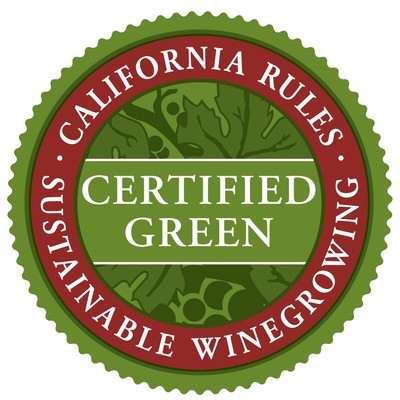
"CALIFORNIA RULES" Certified Green seal found on bottles grown outside the Lodi wine region, also farmed by LODI RULES for Sustainable Winegrowing.
The LODI RULES Certified Green seal
Hence, since 2016 the Lodi Winegrape Commission has slowly but surely been increasing the visibility of its Certified Green seal, awarded to wines farmed in accordance with LODI RULES for Sustainable Winegrowing, first established in 2005 as the world's first third-party certified sustainable viticultural program.
LODI RULES is kind of a big deal. It is a science-based program replete with over 100 "Standards" setting a high bar for responsible farming entailing environmental health, social equity as well as economic viability⏤the three classic pillars of contemporary sustainable agriculture.
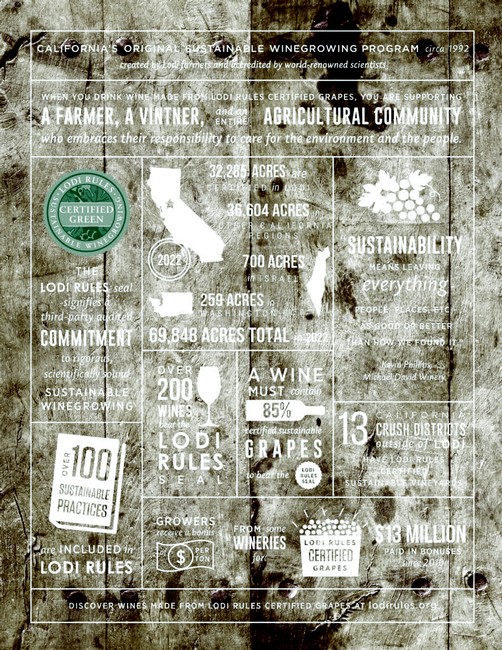
While more than half of the over 72,000 acres certified by LODI RULES in the state are now located outside of Lodi, the number one reason given by growers within the Lodi region to subscribe to these high standards has to do with succession: The motivation to pass along land in better shape than it was before to succeeding generations. In a region where most vineyard land is still owned by the same families for over 50 or over 150 years, succession means everything.
Dr. Stephanie Bolton, who currently directs sustainable research and education for the Lodi Winegrape Commission, has said this about the Certified Green seal:
Consumers do not visit the farms, they usually do not personally know the grower or the winemaker, and so they have to rely on what they see on a label to make their buying decisions. The LODI RULES seal stands for a guaranteed level of value, accountability and trust. There is a truly ridiculous amount of science and accountability backing this up. A wine with a Certified Green seal guarantees the highest level of responsible farming consumers are looking for.
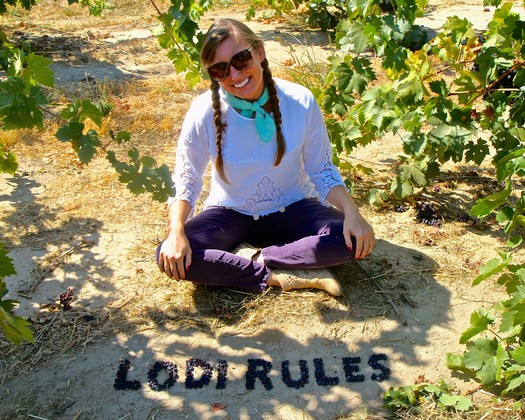
Dr. Stephanie Bolton, Lodi Winegrape Commission's director of sustainable research and education.
In this day and age in which the two youngest generations of adult beverage consumers⏤both Millennials (many now in the maximum consumption age of the mid-to-late 30s) and especially the up and coming Gen Zs⏤are clearly signaling that they care as much about how a wine is grown as the quality that ends up in a bottle, the significance of Lodi's Certified Green seal just continues to grow.
It's a big deal when consumers start prioritizing sustainability even over brand loyalty or wine type preference, which is happening before our eyes. In fact, it is quickly reaching a point where sustainable winegrowing is becoming equivalent to quality in the bottle in the minds of many consumers. Considering the extra care and attention going into certified sustainable grapes, many growers and vintners would concur.
Sustainability is quality. Wine, that is to say, should not only taste great, it should contribute to all of our concerns pertaining to the environment and our future.
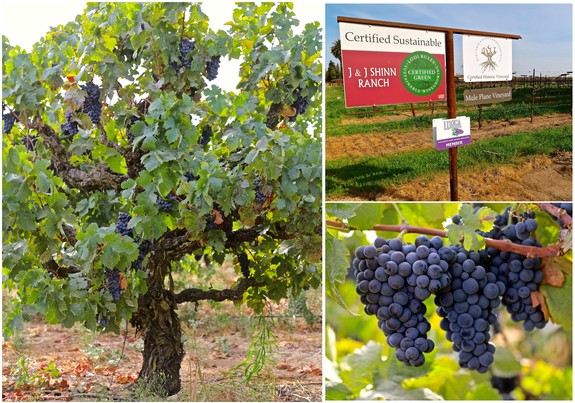
Lodi's Mule Plane Vineyard—own-rooted Carignan planted in the the late 1920s—certified by both LODI RULES for Sustainable Winegrowing and the Historic Vineyard Society.